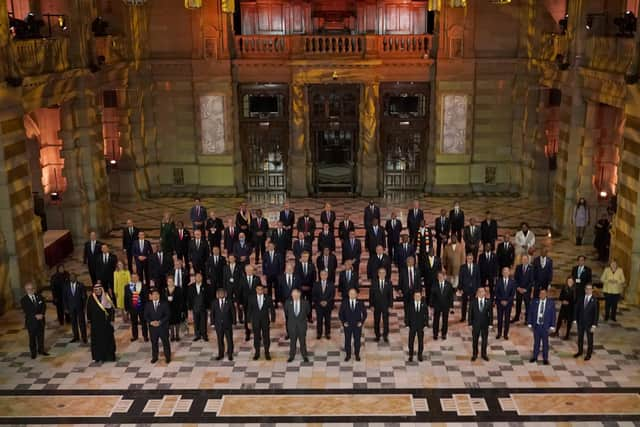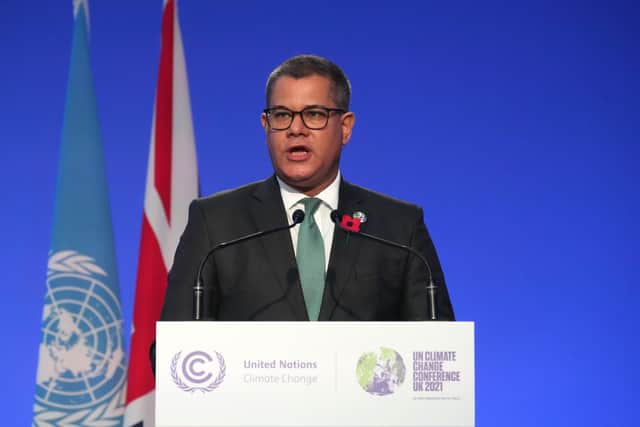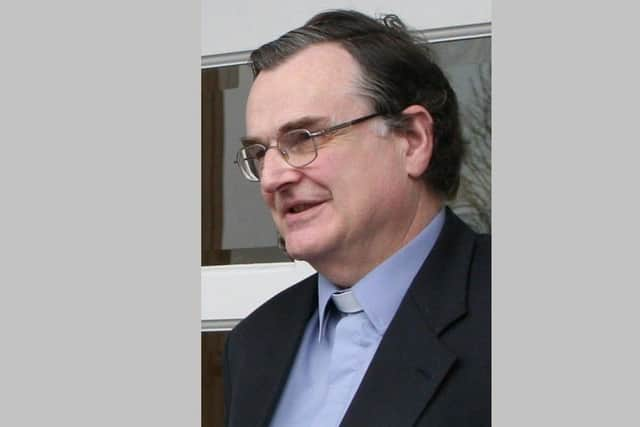Canon Ian Ellis on COP26: Tackling climate change has to be a joint global effort if it is to succeed


The term ‘COP26’ refers to it being the meeting of the 26th ‘conference of the parties’, attended by nations that are party to the UN framework convention on climate change, a treaty agreed in 1994.
The churches have been keenly interested in climate change issues for many years and I remember the topic featuring on church agendas as far back as the 1980s.
Advertisement
Hide AdAdvertisement
Hide AdIn fact, the year 1979 saw the First World Climate Conference, a meeting of experts in the subject. That meeting recognised the need for the nations of the world to “foresee and prevent potential man-made changes in climate that might be adverse to the well-being of humanity”.


That was then. This is now.
Writing ahead of the COP26 gathering, Damian Jackson of the Irish Council of Churches has described it as being “the place where the level of ambition to reduce emissions and support those countries which are worst impacted by climate change will become apparent”.
It is being seen as the most important such event since the 2015 climate talks in Paris (COP21).
On that occasion world leaders signed up for the Paris Agreement, a legally binding international treaty committing signatory states to the goal of limiting global warming ideally to 1.5 degrees celsius.


Advertisement
Hide AdAdvertisement
Hide AdAlthough Donald Trump withdrew the United States from the Paris Agreement, President Biden reversed that decision immediately on becoming president.
Alok Sharma MP, president of COP26, has commented: “We cannot wake up in 2029 and decide to slash our emissions by 50% by 2030”, adding that the UK would “push others not to flinch from the big policy decisions: ending coal power, phasing out polluting vehicles, making agriculture more sustainable, tackling deforestation and supporting developing countries with finance”.
He went on to say that, as one who was born in India, he has real sympathy with less developed countries that feel it is for the developed industrial nations to help sort out a problem that is largely of their making.
Mr Sharma concluded that for those countries most vulnerable to the impacts of climate change, which are already seeing homes disappear under water and crops decimated by drought, “COP26 simply can’t be another talking shop”.
Advertisement
Hide AdAdvertisement
Hide AdAhead to COP26, I took part online in a special churches’ event held in York on the theme, ‘Rise to the Moment’.
A panel of speakers, including Archbishop of York Stephen Cottrell and Rachael Maskell, MP for York Central, spoke and answered questions about the whole subject of climate change.
The event was chaired by Christian Aid’s Peter Moorey who said that it was “more important than ever that we stand together with communities in the global south on the front-line of climate catastrophe”.
In his opening address, Archbishop Cottrell presented a striking, imagined scenario. If every morning we woke up to news of an air crash with hundreds of people killed each time, after only a few days we would be “banging the table and saying, What’s going on, something must be done”.
Advertisement
Hide AdAdvertisement
Hide AdYet, he added: “Just today, the equivalent of twelve jumbo jets worth of people will die for the simple reason that they do not have access to fresh water. But we don’t bang the table.”
Then he illustrated several of the effects of climate change by referring to some of his own experiences travelling abroad.
In Polynesia, rising sea levels meant people’s whole homes and habitats were literally sinking beneath the waves.
Then again, close to the Kenya/Somalia border where it hadn’t rained for 18 months, people showed him the skeletons of their animals, and he remarked on how in a drought animals tend to die first before the people themselves.
Advertisement
Hide AdAdvertisement
Hide AdHe said he had been profoundly moved by the experience of seeing people holding out empty bottles, begging for water, and children having to drink dirty water from a ditch.
Archbishop Cottrell concluded: “What we need is a change of heart, where we start to learn to know what enough looks like. So no, I don’t want strawberries on Christmas Day flown in from the other side of the world. I don’t want that. I need to live differently, I need to inhabit the planet differently, sustainably.”
Rachael Maskell also had important words to say. She spoke of how icecaps are melting, air is destroyed by pollution and people are starving.
She added that such natural calamities are “existential threats”, pointing out that the Syrian crisis had been sparked by a famine, due to the changing climate and drought, concluding: “As we look on our planet, we must know that the beginning of the future begins now. We can never change the past but the future is there to set right.”
Advertisement
Hide AdAdvertisement
Hide AdThe event in York served to emphasise the urgency of the need for action to preserve the Earth for future generations. Yet there is no doubt that it has to be a concerted effort if it is to have any prospect of success.
• Canon Ian Ellis is a former editor of The Church of Ireland Gazette
• Other articles by Canon Ellis below, and beneath that information on how to subscribe to the News Letter
• Ian Ellis Oct 28: The internet has both the freedom and lawlessness that the Wild West once did
Advertisement
Hide AdAdvertisement
Hide Ad• Ian Ellis Sep 30: Church of Ireland to decide on slashing size of synod for first time in 151 years
• Ian Ellis Sep 8: Angela Merkel has not been afraid to ‘do God’ in public life
• Ian Ellis September 2: Power and beauty of the sea raises one’s thoughts to higher things
• Ian Ellis August 12: Churches are seeking input into helping to shape the future of Europe
Advertisement
Hide AdAdvertisement
Hide Ad• Ian Ellis June 3: Ireland could be affected by global push for greater tax justice
• Ian Ellis May 7: On Northern Ireland’s centenary, it is our responsibility to work at making peace more secure
——— ———
A message from the Editor:
Thank you for reading this story on our website. While I have your attention, I also have an important request to make of you.
With the coronavirus lockdowns having had a major impact on many of our advertisers — and consequently the revenue we receive — we are more reliant than ever on you taking out a digital subscription.
Advertisement
Hide AdAdvertisement
Hide AdSubscribe to newsletter.co.ukand enjoy unlimited access to the best Northern Ireland and UK news and information online and on our app. With a digital subscription, you can read more than 5 articles, see fewer ads, enjoy faster load times, and get access to exclusive newsletters and content.
Visit
to sign up
Our journalism costs money and we rely on advertising, print and digital revenues to help to support them. By supporting us, we are able to support you in providing trusted, fact-checked content for this website.
Ben Lowry, Editor